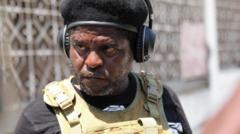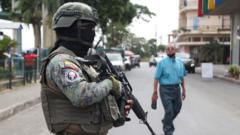A surge in crime and violence-related fears has led parents, like Sibahle Mbasana, to transport their children long distances to historically white-only schools in Simon’s Town, leaving behind inadequate township education facilities plagued by gang influence and violence.
Rise in Parental Concerns Prompt Students to Transfer to Historically White Schools in Cape Town

Rise in Parental Concerns Prompt Students to Transfer to Historically White Schools in Cape Town
Increasing crime and safety issues in Cape Town’s townships are forcing families to reconsider educational options, reverting to former white-exclusive state schools.
Cape Town, once known for its vibrant diversity, is now witnessing an unsettling shift where parental concerns about safety are overshadowing educational accessibility. In the wake of escalating crime and gang violence in the townships, some families are sending their children on arduous daily commutes to former white-only schools, seeking safer educational environments.
Sibahle Mbasana, a mother of three, shared the traumatic experiences her sons endured at a local Khayelitsha school marred by insecurity. "Thugs walked into the school wielding guns, threatening teachers and students," she recounted, painting a grim picture of educational settings that should foster learning but instead expose students to violence.
More than thirty years since apartheid's demise, stark disparities persist, particularly in education. The legacy of the Bantu Education Act of 1953 lingers; township schools are often overcrowded, underfunded, and rife with violence and drug abuse, continuing to affect vulnerable students like Mrs. Mbasana's eldest son, Lifalethu.
In search of better opportunities, the Mbasanas relocated their children to a state school in Simon's Town, 40 km away, which boasts superior facilities and smaller classes. "I refuse to let my daughter experience what my sons went through," said Sibahle, who longs to move out of Khayelitsha but remains trapped by financial constraints.
Safety issues extend beyond the classroom, as parents grapple with the dangers of long commutes. The children rise at dawn to catch buses or taxis, often returning home exhausted. A past incident involving Lifalethu, where he was stranded during an ill-fated bus ride, serves as a stark reminder of the perils they face.
In addition to the physical strains, socio-economic pressures compound challenges for families whose children commute to affluent suburban schools, which traditionally catered exclusively to white students during apartheid. Wealthier families often prefer private schooling, leaving state institutions in these areas to serve a higher percentage of students from the townships.
Amidst persistent inequalities, advocacy groups highlight the urgent need for reform. Reports from organizations like Amnesty International indicate a pressing gap where educational success strongly correlates with wealth and racial demographics, with a bitter disparity between the country’s top schools and poorer institutions.
As parents like Mrs. Mbasana increasingly turn to historically white schools, the gap between wealthier and poorer educational environments remains a pressing concern. The voices advocating for change call for action to address the systemic injustices that jeopardize the futures of countless children still affected by the shadow of apartheid's educational policies.
Children in the townships continue to navigate the trials of a flawed system, and unless significant changes occur, the fear is that many will slip through the cracks, leaving parental hopes for a brighter future hanging in the balance.


















